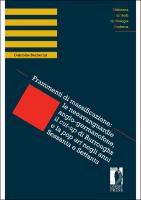Frammenti di massificazione: le neoavanguardie anglo-germanofone, il cut-up di Burroughs e la pop art negli anni Sessanta e Settanta
Abstract
Frammenti di massificazione: le neoavanguardie anglo-germanofone, il cut-up di Burroughs e la pop art negli anni Sessanta e Settanta analyses the influence of William Seward Burroughs’ cut-up method on British and German-language neo-avant-gardes of the 1960s and 1970s from a comparative point of view, with particular attention to the literary context of the Federal Republic of Germany. In four chapters devoted to a profile of this American intellectual and artist, the origins, stylistic features and reception of the cut-up method, the author investigates the reasons for the success of this process, rediscovered by Burroughs and aiming at a reconstruction of text fragments to build up new textual entities. The last chapter is an overview of the most interesting of the uses of the cut-up method in artistic environments other than literary writing, documenting the transformation of a rebellious technique into a new form of expression, i.e. pop art.


 Download
Download Web Shop
Web Shop